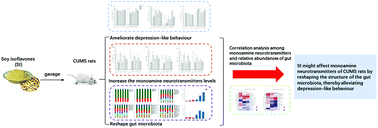Supplementation with soy isoflavones alleviates depression-like behaviour via reshaping the gut microbiota structure
Abstract
Soy isoflavones (SI) are known for their beneficial effects in alleviating neurodegenerative diseases, while the mechanism of alleviation of depression-like behaviour by SI remains unclear. In this study, a chronic unpredictable mild stress (CUMS)-induced depression rat model was used to determine the effect of SI in alleviating depression-like behaviour and its possible mechanisms. SI supplements significantly improved the CUMS-induced depression-like behaviour by increasing the monoamine neurotransmitter levels. A specific SI dose significantly modulated the composition of the gut microbiota, which in turn improved the maximum biotransformation ability of SI. Spearman's correlation analysis illustrated that some of the gut microbiota genera were strongly correlated with monoamine neurotransmitters. Moreover, more attention should be paid to gender differences, which may be related to changes in the gut microbiota. These results suggest that SI might affect monoamine neurotransmitters of CUMS rats by reshaping the structure of the gut microbiota, thereby alleviating depression-like behaviour.



 Please wait while we load your content...
Please wait while we load your content...